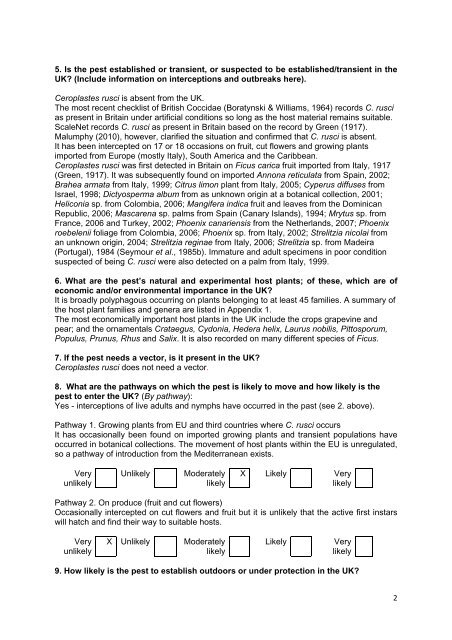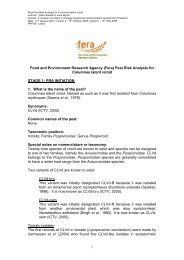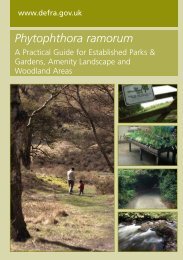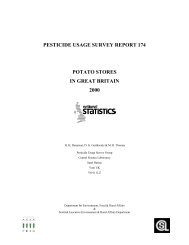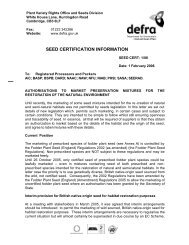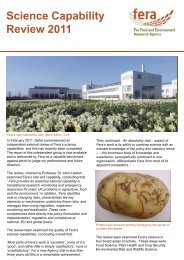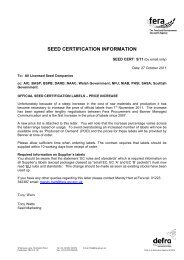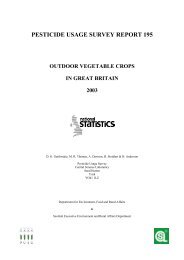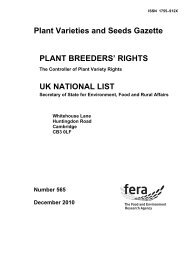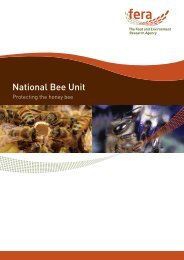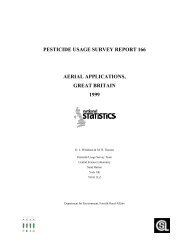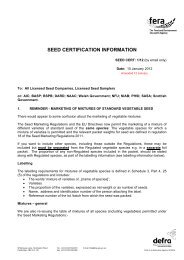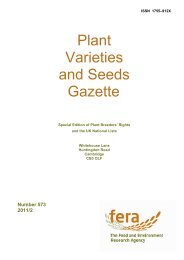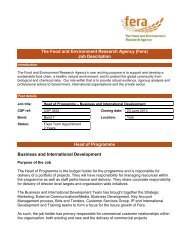Ceroplastes rusci
Ceroplastes rusci
Ceroplastes rusci
You also want an ePaper? Increase the reach of your titles
YUMPU automatically turns print PDFs into web optimized ePapers that Google loves.
5. Is the pest established or transient, or suspected to be established/transient in the<br />
UK? (Include information on interceptions and outbreaks here).<br />
<strong>Ceroplastes</strong> <strong>rusci</strong> is absent from the UK.<br />
The most recent checklist of British Coccidae (Boratynski & Williams, 1964) records C. <strong>rusci</strong><br />
as present in Britain under artificial conditions so long as the host material remains suitable.<br />
ScaleNet records C. <strong>rusci</strong> as present in Britain based on the record by Green (1917).<br />
Malumphy (2010), however, clarified the situation and confirmed that C. <strong>rusci</strong> is absent.<br />
It has been intercepted on 17 or 18 occasions on fruit, cut flowers and growing plants<br />
imported from Europe (mostly Italy), South America and the Caribbean.<br />
<strong>Ceroplastes</strong> <strong>rusci</strong> was first detected in Britain on Ficus carica fruit imported from Italy, 1917<br />
(Green, 1917). It was subsequently found on imported Annona reticulata from Spain, 2002;<br />
Brahea armata from Italy, 1999; Citrus limon plant from Italy, 2005; Cyperus diffuses from<br />
Israel, 1998; Dictyosperma album from as unknown origin at a botanical collection, 2001;<br />
Heliconia sp. from Colombia, 2006; Mangifera indica fruit and leaves from the Dominican<br />
Republic, 2006; Mascarena sp. palms from Spain (Canary Islands), 1994; Mrytus sp. from<br />
France, 2006 and Turkey, 2002; Phoenix canariensis from the Netherlands, 2007; Phoenix<br />
roebelenii foliage from Colombia, 2006; Phoenix sp. from Italy, 2002; Strelitzia nicolai from<br />
an unknown origin, 2004; Strelitzia reginae from Italy, 2006; Strelitzia sp. from Madeira<br />
(Portugal), 1984 (Seymour et al., 1985b). Immature and adult specimens in poor condition<br />
suspected of being C. <strong>rusci</strong> were also detected on a palm from Italy, 1999.<br />
6. What are the pest’s natural and experimental host plants; of these, which are of<br />
economic and/or environmental importance in the UK?<br />
It is broadly polyphagous occurring on plants belonging to at least 45 families. A summary of<br />
the host plant families and genera are listed in Appendix 1.<br />
The most economically important host plants in the UK include the crops grapevine and<br />
pear; and the ornamentals Crataegus, Cydonia, Hedera helix, Laurus nobilis, Pittosporum,<br />
Populus, Prunus, Rhus and Salix. It is also recorded on many different species of Ficus.<br />
7. If the pest needs a vector, is it present in the UK?<br />
<strong>Ceroplastes</strong> <strong>rusci</strong> does not need a vector.<br />
8. What are the pathways on which the pest is likely to move and how likely is the<br />
pest to enter the UK? (By pathway):<br />
Yes - interceptions of live adults and nymphs have occurred in the past (see 2. above).<br />
Pathway 1. Growing plants from EU and third countries where C. <strong>rusci</strong> occurs<br />
It has occasionally been found on imported growing plants and transient populations have<br />
occurred in botanical collections. The movement of host plants within the EU is unregulated,<br />
so a pathway of introduction from the Mediterranean exists.<br />
Very<br />
unlikely<br />
Unlikely Moderately<br />
likely<br />
X Likely Very<br />
likely<br />
Pathway 2. On produce (fruit and cut flowers)<br />
Occasionally intercepted on cut flowers and fruit but it is unlikely that the active first instars<br />
will hatch and find their way to suitable hosts.<br />
Very<br />
unlikely<br />
X Unlikely Moderately<br />
likely<br />
Likely Very<br />
likely<br />
9. How likely is the pest to establish outdoors or under protection in the UK?<br />
2


